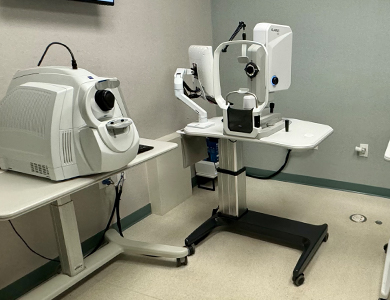
How Comprehensive Eye Exams Can Detect Eye Disease Early
Your vision is one of your most precious senses, allowing you to navigate the world and engage with your surroundings. Maintaining optimal eye health is crucial for your overall well-being, as your eyes play a vital role in your daily life. From reading and driving to enjoying hobbies and socializing, clear and comfortable vision is essential for your quality of life.
Unfortunately, many eye diseases and conditions can develop silently, without obvious symptoms in the early stages. These issues, if left undetected and untreated, can lead to vision loss, impaired functionality, and even permanent damage to your eyes.
What is a Comprehensive Eye Exam?
A comprehensive eye exam is a thorough evaluation of your eye health and vision. During this exam, an optometrist performs various tests to check for vision problems, such as nearsightedness or farsightedness, but they also look for early signs of eye diseases that could affect your vision later on. Some common components of a comprehensive eye exam include:
• Visual acuity tests: Measures how well you see at different distances.
• Refraction test: Determines your prescription for glasses or contact lenses.
• Eye movement test: Assesses the coordination of your eye muscles.
• Retinal exam: A close look at the back of your eye (retina), blood vessels, and optic nerve.
• Intraocular pressure (IOP) test: Checks for signs of glaucoma by measuring pressure inside the eye.
Common Eye Diseases that Can Be Detected Through Comprehensive Eye Exams
Comprehensive eye exams are instrumental in identifying a variety of eye diseases and conditions. Some of the most common eye diseases that can be detected through these comprehensive assessments include:
• Glaucoma: Glaucoma is a group of eye diseases that can damage the optic nerve, leading to vision loss and even blindness if left untreated. Comprehensive eye exams can measure eye pressure and assess the optic nerve for signs of glaucoma, allowing for early intervention.
• Cataracts: Cataracts are a clouding of the eye's natural lens, which can cause blurred vision, sensitivity to light and glare, and difficulty seeing at night. Comprehensive exams can detect the presence and progression of cataracts, enabling timely treatment.
• Age-Related Macular Degeneration (AMD): AMD is a leading cause of vision loss in older adults, affecting the macula, the part of the eye responsible for central vision. Comprehensive exams can identify early signs of AMD, such as changes in the retina, allowing for proactive management.
• Diabetic Retinopathy: Individuals with diabetes are at a higher risk of developing diabetic retinopathy, a condition that can damage the blood vessels in the retina. Comprehensive exams can detect this condition early, when it is most treatable.
• Dry Eye Syndrome: Dry eye syndrome is a chronic condition that can cause discomfort, irritation, and vision problems. Comprehensive exams can diagnose dry eye and determine the underlying cause, enabling appropriate treatment.
By identifying these and other eye diseases early, comprehensive eye exams play a crucial role in preserving your vision and overall eye health. Regular comprehensive exams can help you maintain optimal vision and catch any potential issues before they become more severe.
The Benefits of Early Detection and Treatment
Early detection and treatment of eye diseases and conditions are essential for preserving your vision and overall eye health. When eye problems are identified in their early stages, your optometrist can implement effective interventions that can often prevent or slow the progression of the condition, leading to better outcomes. By addressing eye diseases and conditions in their early stages, comprehensive eye exams can help you maintain clear, comfortable vision and prevent vision loss or impairment.
Many eye diseases, if left untreated, can cause irreversible damage to the structures of the eye, leading to vision loss or blindness. Early detection and treatment can help minimize or even prevent this permanent damage. In the early stages of an eye disease or condition, the available treatments are often more effective and less invasive than in the later stages. This can lead to better outcomes and a higher quality of life.
By prioritizing comprehensive eye exams, you can take a proactive approach to your eye health and ensure that any potential problems are identified and treated in a timely manner. This can help you preserve your vision and maintain your overall well-being for years to come.
Schedule Your Comprehensive Eye Exam with ClearView Optometry Today
At ClearView Optometry, we are dedicated to providing comprehensive eye care services to help you maintain optimal vision and eye health. Our experienced optometrists utilize the latest technology and techniques to detect and manage a variety of eye conditions, ensuring you receive the personalized care you deserve.
Schedule your comprehensive eye exam with ClearView Optometry and take the first step towards safeguarding your vision for years to come. Visit our office in Shafter, California, or call (661) 746-6989 to book an appointment today.







